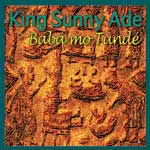Reviews September 30, 2010
Baba Mo Tunde
Just in time for the 50th anniversary of Nigeria's independence (October 5, 2010), the country's greatest living music star, King Sunny Adé, unveils a spectacular double CD, proving that juju remains a driving force in African music. This is Adé's first international release of new music in 10 years, and it is a doozy! There are some new colors in the sound, but fundamentally this is a return to form. Back when outsiders first discovered juju music in the early 80s, Adé had built a stellar career in Nigeria with his “non-stop” sound. His vinyl LPs offered seamless streams of bubbling percussion, tangling guitars and melodious call-and-response vocals. Songs slid from one to another without a pause until there was no more room on the side. After Adé signed to Island Records, he began a shift to shorter, radio-friendly formats, as on his 1982 classic Juju Music. Fans who wanted to experience non-stop Adé had to attend one of his ecstatic concerts with his juggernaut band, African Beats.
In this comeback release, Adé stretches out gloriously, unconcerned with cow-towing to foreign radio, which mostly ignores African music anyway-- Afropop Worldwide being an obvious exception! There are just seven songs on these two CDs, the longest running more than a half-hour, the shortest still approaching ten minutes. The session was tracked last year outside Philadelphia, and just for the luminous clarity of the sound, it's a landmark juju recording. The first thing that hits you is the sheer energy of these performances. The tempos are ferocious, the density of the percussion grooves mind-boggling, and the taut energy of the stop-time passages where all the players pounce in lock-step, just takes your breath away. Adé might be a sage veteran these days, but he's had the sense to replenish his band constantly with excellent young musicians, and the results are palpable through every minute of a thrilling two hours of music here. And when he signals a shift with his signature chiming electric guitar, we jump to attention, just like his crack musicians.
Longtime fans will note some changes in the sound. The pedal steel guitar that was once an African Beats trademark is absent, and missed, though the rich guitar work that remains is as piquant and splendid as ever. Keyboards are more restrained here than on some 80s and 90s Adé releases, and that's a plus. Keys mostly support guitar passages, or fill in with organ sounds that fit nicely with the religious themes that dominate this set of songs. Overall, percussion is king here, and different songs feature different registers of Adé's august ensemble-deep articulations of talking drums on “Bábá Mo Túndé (Father I'm Back)” and a higher-pitched, clicking drum on “Bábá Feran Mi (Father loves me).” Within these long arrangements, there is ample time for all sorts of textures to emerge, chattering guitars here, lush vocal exchanges there, and frequent bouts of elegant rhythmic barrage when the curtain opens on those fabulous percussionists.
On the second CD, two tracks break further new ground. First, there is King Britt's fun and funky remix of “Baba Mo Tunde,” clocking at 15 minutes, half the length of the source track. Britt plays with the rhythmic backbone of the song, and laces in a pleasant, xylophone-like patch. These two tracks appear back-to-back, and together fill as much time as some complete CDs, but there's so much going on in the mixes, and the spell cast by the original in particular is so deep that these epic tracks never feel overstuffed or indulgent. The journey ends with “Eyi Ma Dun To (This is sweet enough),” which features a march-like 6/8 feel, an intriguing metallic guitar sound, and most notably a warm flute part that weaves through the juju tapestry adding a delightful new color to the mix. Sweet enough, indeed!
On the album's religious themes, there is much to say. Adé subtitles the album “Songs of Spirituality, Hope and Redemption.” The brief song descriptions in the notes focus on Adé's reverence and devotion, the very core of his musical motivation it seems. (Full translations of the songs are available at www.kingsunnyade.net.) The CD's sleeve notes include a fascinating essay by Professor Wande Abimbola that adds deeper dimension to the song texts. Abimbola touts the huge contribution Adé has made to Yoruba literature. Yoruba is the language of perhaps Africa's most populous ethnic group. And yet, at a time when most Nigerian singers are gravitating toward English, creolized Yoruba, or other hybrid tongues, Adé champions the subtle nuances of classic Yoruba. These songs are full of proverbs and praise poems ( oriki), a few of which Abimbola skillfully translates and interprets in his essay. Adé's spiritual world is a fascinating amalgam of old Yoruba belief and lore and a strong Christian overlay.
Religiosity turns out to be a particularly fitting foundation for this release. Since Adé made these recordings in 2009, he has faced deep personal tragedies, the loss of two prized musicians in a car accident last spring, and in June, the death of his beloved mother, Princess Mariam Adeniyi Adegeye. Adé dedicates Bábá Mo Túndé to her, and it is a powerful gesture. Far from recycling his past, or carrying on with tired old formulas, this veteran proves that he is still a crucial force in African music. If Adé can sound this fresh and vigorous after all these years, he is indeed a fitting model of renewal for Nigeria as it marks its first half-century.









